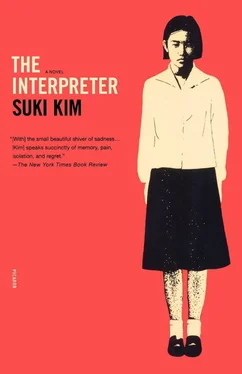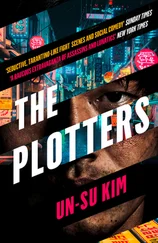Suki Kim - The Interpreter
Здесь есть возможность читать онлайн «Suki Kim - The Interpreter» весь текст электронной книги совершенно бесплатно (целиком полную версию без сокращений). В некоторых случаях можно слушать аудио, скачать через торрент в формате fb2 и присутствует краткое содержание. Город: New York, Год выпуска: 2011, ISBN: 2011, Издательство: Picador, Жанр: Детектив, Триллер, на английском языке. Описание произведения, (предисловие) а так же отзывы посетителей доступны на портале библиотеки ЛибКат.
- Название:The Interpreter
- Автор:
- Издательство:Picador
- Жанр:
- Год:2011
- Город:New York
- ISBN:0-312-42224-5
- Рейтинг книги:3 / 5. Голосов: 1
-
Избранное:Добавить в избранное
- Отзывы:
-
Ваша оценка:
- 60
- 1
- 2
- 3
- 4
- 5
The Interpreter: краткое содержание, описание и аннотация
Предлагаем к чтению аннотацию, описание, краткое содержание или предисловие (зависит от того, что написал сам автор книги «The Interpreter»). Если вы не нашли необходимую информацию о книге — напишите в комментариях, мы постараемся отыскать её.
The Interpreter — читать онлайн бесплатно полную книгу (весь текст) целиком
Ниже представлен текст книги, разбитый по страницам. Система сохранения места последней прочитанной страницы, позволяет с удобством читать онлайн бесплатно книгу «The Interpreter», без необходимости каждый раз заново искать на чём Вы остановились. Поставьте закладку, и сможете в любой момент перейти на страницу, на которой закончили чтение.
Интервал:
Закладка:
His eyes are unhappy —that was her first thought. Deep, penetrating blue eyes that did not appear exactly hard, but somehow absent, even heartless. The rest of him she noticed much later: that he was considerably older, stood quite a bit taller than her five-foot-five frame, had a faint dimple on his left cheek that seemed out of place, and a face marked by permanent stubble that would graze against her thighs when finally opening her up into complete honesty. But in that initial second when she saw him standing so near that she could almost feel his fine-lined, insistent fingers on her, she thought, I must seem so terribly young .
Certainly an odd reaction to a stranger, as he was to her then, an older man, neither particularly handsome nor striking, a passerby possibly her father’s age, although her father always seemed older than those around him, whose conviction was the absolute law by which everyone must abide, because he was the sort of man no one in the family disobeyed. But when Suzy saw Damian that first time, she felt hopelessly young, almost silly, naked, as though she knew that he could see through her own flaring vulnerability as she stood there in her brown suede jacket and faded Levi’s, looking so lovely and tortured the way nineteen-year-olds can look on wet April days, staring up at this older man who seemed to have appeared from nowhere.
In fact, Suzy had never really known men. The boys around her age never showed much interest in her. It did not help that her father forbade dating. “School dances? Whatever for? Schools are not for dancing around!” In Korea, he said, girls did not frolic like these American ones. In Korea, he said again, girls stayed clean, as girls should. Under Dad’s “Korean girl” rules, nothing was allowed: no lipstick, no eye shadow, no hair dye, no perm, no perfume, no miniskirts, no cigarettes, and absolutely no boys, especially American boys. The family’s frequent moving seemed to guarantee all that. The girls never stayed in one school long enough to develop a crush. No time to get attached to sinful American habits, Dad used to say. Suzy thought he was justifying all the years of moving his family around. He might have even been trying to blame them. There never was a doubt that, when the time was right, Suzy and Grace would marry decent Korean men. Once, during a drive to a church on Sunday, they nearly hit a puppy, a curious mix of terrier and chow. It looked strange as it whimpered away, a hybrid with pointy ears and a moon face. Dad declared, laughing, “See what happens when you mix blood? Even dogs turn out a mess, stupid and ugly!”
Grace somehow managed to sneak around with boys behind Dad’s back. She would make up excuses about the yearbook committee or student-council meetings and tumble in long after the nine o’clock curfew, and Suzy knew where she had been just by looking at her rumpled skirt and tangled hair. Grace had always been the daring one until she found God and moved to New Jersey. Suzy, on the other hand, never even kissed a boy until her freshman year in college, when she moved out of her parents’ house into the dorm. His name was Brad. Suzy never even knew his last name. He was her first roommate Liz’s boyfriend and stayed over every weekend; each time Suzy turned to the wall to sleep, she would hear moans and giggles from the other bed. Then, one day, Suzy came back from class and found him waiting for Liz. It was awkward to be puttering about with him sitting on Liz’s bed. The silence hung heavy as Suzy sat facing the desk, still feeling his eyes on her. It was when she decided that she’d had enough and began gathering her books that she felt his hands on her shoulders. He said nothing at all, and Suzy just froze. He slowly turned her around and kissed her without hesitation, not the sweet and soft kind, but the forceful probing of a tongue that was confident and mechanical. Then he walked away from her and lit a cigarette and asked when Liz was coming back. “Any minute now,” Suzy answered without looking at him, and threw the books in her bag and walked out. He never kissed her again, and Liz never knew.
Later, Suzy would recall that first kiss as if it were an omen. What was it about her that marked her as the other woman? What did he see?
What Suzy never forgot was the smell. It was a sick smell, like something dying almost, like instant powdered milk, nondairy creamer, the milky-baby smell but fake. It leaped into her throat and would not wash away, no matter how fiercely she rinsed her mouth afterward. Each time she kissed boys after that, she looked for the smell. She pretended to kiss them and looked for the smell. Sometimes she would sniff the awful smell and would push the boy away violently and never speak to him afterward. But when the smell wasn’t there, she would be curiously disappointed. It was as if nothing quite erased the initial shock of being kissed by someone who was not hers, a kiss that was stolen, claimed from her flippantly, a kiss so abrasively illicit that she seemed to deserve it, as though she was not worth much to begin with. It stuck with her, the shame, the smell, and came back at odd moments, such as when she stood on the steps of St. John the Divine and saw in the older man’s eyes a clear reflection of herself, terribly young and terribly dissatisfied.
Damian would later confess that he had indeed followed her from the lecture hall. What made him do it? He would never say. He might have been bored, or simply tempted by a young woman who seemed as unmoved as he was by his wife’s lecture, or, more likely, he really had nowhere he wanted to be on that afternoon. Perhaps he wanted Yuki Tamiko to notice him following the girl; that Suzy reminded him of Yuki at nineteen was a minor detail he would have preferred not to see. But he did follow her, which was embarrassingly impulsive for someone so much older and supposedly more sensible. He followed her all the way down the College Walk and along Amsterdam Avenue, to stand before her finally with an awkward smile, which only accentuated his lone dimple, and seemed to her somehow heart-breakingly sad. His stare did not waver, and she stared back, because she thought it might make her appear less young. Finally, one of them burst out laughing—Suzy is not sure which—and soon both were laughing like kids who had cut class and gotten away with it.
Ten years since, and it seems impossible now that she should be alone, no parents, no Damian. She thought that the choice was one or the other, and it was up to her to decide. It never occurred to her then that she would lose both, that she would not be able to keep the one even after sacrificing the other, and that the choice was never really there from the beginning.
All around her, people are gathering their things. 11:37 a.m., Montauk. Outside is the November beach town, empty and forlorn. Between the rain streaks on the windowpane are her parents buried at sea, half rising to meet their daughter here at last.
6.
NOTHING IS AS DESOLATE as a late-autumn beach. The motels with “Vacancy” signs wear the dejected face of the abandoned. The fish-and-chips stands have pulled down their shutters, closed for the winter. Fickle and selfish, the rest of the world has skipped out. Gone are the flirtatious smiles, the bronzed bodies, the neon beach balls flopping down on the bluest water. Girls with names like Tracy and Cindy and Judy no longer hang out at McSwiggin’s, which is the only bar near the train station still open for business.
Even at this early hour, a few men are stooping at the bar, nursing pints. They glance at Suzy but soon look away with the stolid faces of small-town men. Most fishermen hang out at the dock, on the other side of the town, where many bars remain open, lobster and swordfish being their prime catch this season. But the nonfishing locals, mostly Irish descendants, prefer the bars in town, where the grime and sweat of the fishing crowd remain far away, where they might hang on to their Montauk as a sort of Hawaii for Long Island’s working class.
Читать дальшеИнтервал:
Закладка:
Похожие книги на «The Interpreter»
Представляем Вашему вниманию похожие книги на «The Interpreter» списком для выбора. Мы отобрали схожую по названию и смыслу литературу в надежде предоставить читателям больше вариантов отыскать новые, интересные, ещё непрочитанные произведения.
Обсуждение, отзывы о книге «The Interpreter» и просто собственные мнения читателей. Оставьте ваши комментарии, напишите, что Вы думаете о произведении, его смысле или главных героях. Укажите что конкретно понравилось, а что нет, и почему Вы так считаете.












